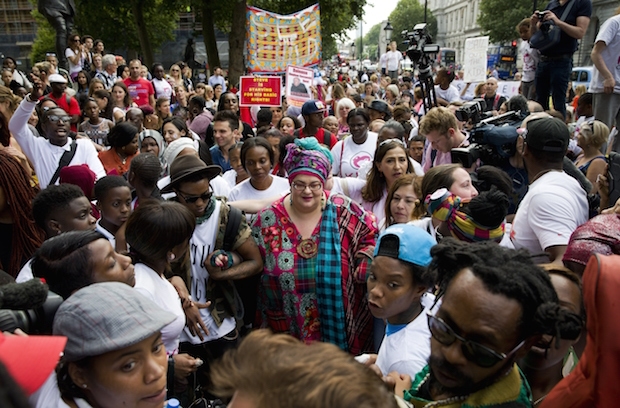Kids Company staff and service users have been protesting outside Downing Street today after the charity announced it was closing its doors. But the Prime Minister isn’t there: he’s on holiday. He did, however, give this clip to broadcasters in which he defended his ministers’ decision to overrule officials’ concerns and give the struggling charity a further £3 million:
‘Well, the government thought it was the right thing to do, to give this charity one last chance of restructuring to try to make sure it could continue its excellent work. Sadly that didn’t happen, not least because of the allegations that were made and private donors withdrawing their money, but I think the government was right to say, let’s have one last go at trying to keep this charity going, given the excellent work it has done for so many young people.’
One of the key questions for ministers in this saga has been why they went against guidance from the Cabinet Office permanent secretary to approve the £3 million grant, the terms of which Kids Company then breached by using it to pay staff. David Cameron stuck in his clip to the narrative of the second chance that he uses repeatedly when justifying why he has stuck by a beleaguered ally. Usually this is an ally in politics, not a charity, but his argument about trying to have ‘one last go’ does sound compelling and compassionate.
It is worth emphasising, given the protest outside Downing Street, that David Cameron wasn’t the person who decided to close Kids Company. He also wasn’t responsible for its failure to build up reserves (something the Guardian examines today). Even though Camila Batmanghelidjh hinted darkly at a plot in government because of her outspokenness on various issues, the main weakness that ministers appear to have had was in continually acquiescing to the charity’s requests for money, rather than being stingy.
However, given we are where we are with the closure of the charity, ministers really do now need to answer the question of what will be done to help those children who the charity was responsible for. Mentors are wondering whether it is safe to contact their mentees, having been trained from the start about the dangers of abruptly breaking off contact with vulnerable children who often struggle to trust adults because so many promises and relationships have been broken at formative stages in their lives. Local authorities are not wallowing in cash, but have also never been very good at providing the sorts of relationships and support that Kids Company offered its children.
So what happens to those children? That is a much more important question even than whether ministers always give second chances to struggling charities – or just struggling charities with friends in high places.







Comments